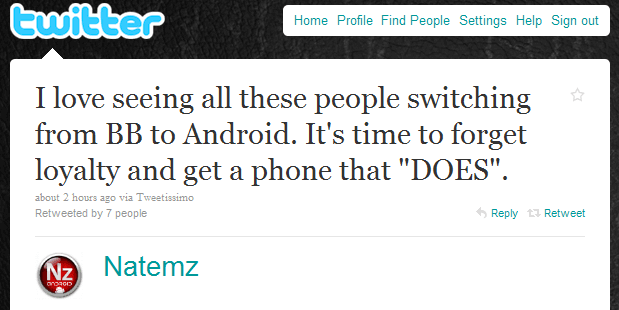A while ago, I created a search column in Tweetdeck to see what people have to say about loyalty on Twitter. To my surprise, once the column was created, tweets just started flying in. There has been rarely a day when I do not see at least a few hundred public tweets containing the word “loyalty”. Apparently, loyalty is on people’s mind often. Out of curiosity, I started to dig a little deeper and more systematically into what is being said about loyalty in these tweets. While I’m not quite done with my analysis yet, here I’d like to share some of my initial discoveries.
What/Whom Are People Loyal to?
When we talk about loyalty, we usually imply an object or person that we are loyal to. From the tweets that I have analyzed, here are the most often objects of loyal passion:
- A romantic relationship or partners in the romantic relationship
- Friends and family
- Sports team
- Brands/products
- Co-workers/boss
- Dogs’ loyalty to their owners (such as this touching story from Wikipedia about this Hachiko dog)
Interestingly, when specific brands or products were mentioned as objects of loyalty, mobile products such as cellphones and mobile providers were the most frequently referred-to product category. For instance, earlier today, there were a few retweets of the message by @Natemz below.

In this case, the tweet is actually a counter-loyalty message, where product features beat loyalty. But it still implies loyalty that some people used to have for BlackBerry before they switched to Android. Of course, this frequent association between mobile products and loyalty in tweets is most likely biased, given that Twitter is very much a mobile platform. But I have yet to come across any other product or product category that gets mentioned nearly as frequently.
What is Loyalty?
It would be rather ambitious to try to capture the full meaning of loyalty in 140 characters. But exactly because tweets are short, they also tend to be very on the point. The most frequent words I have seen tweeple use to describe loyalty are: trust, respect, honesty, and commitment. If I were to summarize a general definition of loyalty from these tweets, it would go something like this: a loyal relationship is one in which all parties respect one other, are honest to and able to trust one another, and are committed to making the relationship last.
Another word that was often brought up with loyalty is love. While you would think love and loyalty go hand in hand as those other words above, many tweets contrast love with loyalty, and most if not all prefer loyalty over love. That certainly shows the power of loyalty in people’s minds. But one tweet led me to this simple poll on Tagged asking you to choose love or loyalty. On completing the poll, I saw that 57% of respondents chose love and 42% preferred loyalty. While the relative importance of love vs. loyalty cannot be determined just yet, the fact that loyalty is being compared to and almost comes close to one of the most universal concept among the human race suggests it is something we cannot ignore.
Who Are These Tweeple?
So who are all these people that have been talking about loyalty on Twitter? While I have not been able to run a complete demographic analysis on these individuals, I am going to classify them psychologically into three categories based on their message content:
- The loyalty advocates/evangelists: these are individuals who fully appreciate the power and importance of loyalty and express it passionately in their tweets. To these people, loyalty is critical to the cohesion of a family and a relationship, the strength of an army and a nation, and even success in life in general. They are also the ones who say they will choose loyalty over money and everything else in a heartbeat.
- The loyalty wounded: individuals who express disappointment in loyalty in general, most often from their experience of betrayal by someone in the past. In their tweets, they question the existence of true loyalty in today’s society, and they lament the loss of it in their life and their relationship.
- The loyalty objectives: these are most often individuals who work in the customer loyalty industry. They certainly cherish the value of loyalty like the first group. But their messages express a more neutral tone of support. They focus mostly on the approaches to take to achieve customer loyalty, whether it’s technology, product superiority, or customer service.
Through this interesting exercise on Twitter, I find my eyes opened by what other people are thinking about loyalty. As I move further along with my analysis, I see potential for more ideas and concepts to emerge, and the best part is that these are all natural conversations that people are having. Do you have a loyalty question you would like to see answered in my analysis? If so, please leave a comment here and I will try to find the answer for you.
One thought on “Loyalty According to Tweeple”
Comments are closed.